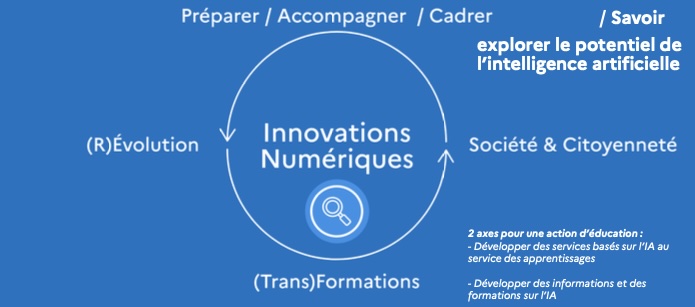In a context where AIs are ubiquitous, they still hold many secrets from us. The current challenge lies in not merely succumbing to their influence but in using them thoughtfully and efficiently in service of humans, especially in education for the younger generations who represent our future.
Action Frameworks and Historical Context
Following the Villani report « #AIForHumanity, » released in 2018, the teams at the Ministry of Education, notably the Directorate of Digital Education, initiated the first partnership for Artificial Intelligence innovation.
« This report establishes a framework acknowledging that AI is already present and growing exponentially, and it’s time to ask the right questions because it will permeate all of society. » introduces Axel Jean, head of the Office for Digital Innovation Support and Applied Research at the Directorate of Digital Education, with whom we conducted this interview.
In the digital education strategy implemented for four years (2023-2027) – as of November 2023, with Audran Le Baron, Director of the DNE, as discussed in our interview here – there is a strong focus on AI, which is part of a national AI strategy that extends beyond the Ministry of Education. « There are also security issues, for example, and the direction of various emerging professions that we need to prepare young people for » specifies Axel Jean.
Furthermore, their actions align with the European plan « Digital Education Action Plan (DEAP 2021-2027), » where axis number 6 is dedicated to AI.
« Axis 6 addresses the question of ethics in AI usage, what we can do, and what we should do » Axel Jean explains.
As with any innovation, it’s important with AI not to focus solely on what the technology can do but on what we should do with it. In this regard, Axel Jean emphasizes the importance of not exploiting the full potential of the technology and « doing anything with it, » but rather staying within a reasonable, democratic perimeter that is beneficial to citizens.
Thus, it’s crucial for schools to address these issues.
« There is a huge challenge in media and information literacy and in educating our students to have critical thinking skills so that they can make informed choices as enlightened citizens and not just consumers.«
Role of AI in Education
For him, it’s the role of a democracy to regulate AI usage, and within a relatively short period of less than 5 years, it’s crucial to be reactive so as not to be subjected to AIs devised by others.
He cites the example of the company that created TikTok, originating from China, which China has recently banned for those under 16; indeed, the Chinese government considers this service to be detrimental to its population. In France, however, young generations favor this social network, and so far, no recommendations or « bans » have been implemented.
« In the face of any disciplinary challenge, there is a need for media education so that these issues are addressed in schools right away and now, » argues Axel Jean.
The Wave of Generative AIs and Their Consequences
The arrival of ChatGPT at the end of 2022 and the beginning of 2023, and its widespread and rapid availability to the general public, marked an unprecedented phenomenon.
For Axel Jean, « we have experienced industrial revolutions, but this one has a particularity: it is extremely rapid and it impacts ‘white-collar workers’. »
The Ministry of National Education must accompany all transformations, including this one. For example, regarding certain fields, they naturally need to be reconsidered as they are directly impacted by the arrival of generative AIs.
« The introduction of generative AIs often focuses on how I can use them in the classroom and in my discipline, but before that, we must consider the societal stakes that we must accompany, train teachers, alert students, etc., » explains Axel Jean.
Currently, generative AIs are very « California-centered. » In this statement, it is necessary to understand that the now giant companies have made choices very focused on their users, who are predominantly Anglo-Saxon. This raises questions about the resources that are offered, which completely ignore minorities, and whose models are based on the thinking of « a few engineers based in California, and this situation really needs to be questioned. » emphasizes Axel Jean.
He adds, « generative AIs produce the most probable outcomes. It would be good for France to develop large language models, which is currently underway, with training data based on the French-speaking community and European culture.«
As part of the previously mentioned national AI strategy, it should be noted that the State has allocated 50 million euros for the development of language models trained on a broad French-speaking and European basis.
Development of Large Language Models Based on Francophone and European Data
With the 50 million euros allocated by the French government for the development of two large language models, it should be noted that they will be trained on a Francophone and European basis, and all algorithms, datasets, and software will be open-source.
« In about a year, these are tools that teachers can rely on consciously, safely, and transparently. » emphasizes Axel Jean.
For him, it is important not to concede defeat, and even though ChatGPT has taken a significant lead, « we are not condemned to passively endure without reacting, » he adds.
It is evident that generative AIs have permeated all aspects of society, including education. To facilitate this change, the Ministry has embarked on a vast project: training at all levels, « which is a necessary condition for everyone to be able to understand what we are talking about » specifies Axel Jean.

Since 2018, following the Villani report, the DNE (Directorate of Digital Education) has initiated public procurement processes as part of the Artificial Intelligence Innovation Partnerships (P2IA), aimed at « developing services based on AI to assist teachers in student activities. »
In essence, before the advent of AI, efforts were directed towards differentiation, and AI enables this promise to be better fulfilled, to differentiate more effectively.
« The crucial balance point is that AI is simply an assistant to the teacher; there is no doubt that the pedagogical expert is indeed the teacher » Axel Jean emphasizes.
For example, a French teacher who wants to work on conjugation in the imperfect tense can ask the AI to create exercises at four different levels; exercises that will be generated on paper or digitally for students, based on data and sources provided by the teacher.
It’s not a classroom without the teacher; it’s the teacher having an additional service, based on AI, in their toolbox.
For groups with specific needs, the AI assistant can also help the teacher create « dynamic » need-based groups. The principle is that after each activity, students can move between need-based groups, which is very difficult to manage on a daily basis without such tools because it’s time-consuming.
Once again, it’s up to the teacher to make the final decision regarding the assignment of students to specific need-based groups. This is a point of pride that Axel Jean also wishes to emphasize in these systems: that AI should only be part of the evaluation process.
« AI or digital tools should never constitute 100% of a student’s evaluation » he stresses.
Currently, DNE teams are tasked with developing services to assist teachers through the P2IA initiatives launched in 2019 for cycle 2 classes in French and mathematics.
Since January 8, 2024, the Ministry has launched a new Artificial Intelligence Innovation Partnership for French, mathematics, and modern foreign languages for cycle 3, with plans underway for a similar initiative for cycle 4.
The novelty for this new wave of P2IA is the classroom co-construction: « for 15 months, the project will be tested in real classrooms with willing participants. »
« So, we’re putting the primary user, namely the teacher, at the center of the process, who can provide regular feedback on the use of the solution, both to the Edtech company and to the researchers with whom they are working. With this feedback, we can then decide whether or not to purchase licenses for this service in order to provide it free of charge to French teachers. » explains Axel Jean.
In summary, the service offered with generative AI must:
- Be centered on the user, namely the teacher, who must define their need.
- Allow the teacher to choose whether to use all or part of the service and its suggestions.
- Offer better differentiation for students.
Furthermore, it is understood that the proposed environment is entirely secure and compliant with GDPR.
In conclusion, Axel Jean emphasizes that there are many questions and anxieties surrounding the subject of AI, and this is entirely normal. However, some still believe that AI is just a trend and that, like all trends, it will pass.
« But if it’s not just a trend, and if we remain anchored in the 20th century, we will have lost 2-3 extremely valuable years for young people, especially adolescents between the ages of 14 and 17. » he reminds us.
He particularly alludes to fields such as cybersecurity and all current and future digital professions for which we are sorely lacking candidates.
« There are clearly issues of orientation and careers that need to be addressed quickly, targeting both boys and especially girls! »
As you know, these fields are not popular among girls in France, and yet it is essential to activate the « inspiration/motivation » mode because, as Axel Jean rightly points out: « In AI, if we have as many girls as boys, it means that the models developed will reflect the biases of both girls and boys; whereas if we have more boys in these fields, what will be proposed will inevitably be predominantly from the male perspective. »
« And then you’re depriving yourself of 50% of human intelligence. It’s terrible.«
That will be the final word. Something to reflect on and share widely, of course !
Source: « Featured Image » credit Photo DNE








